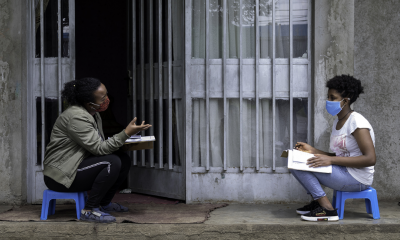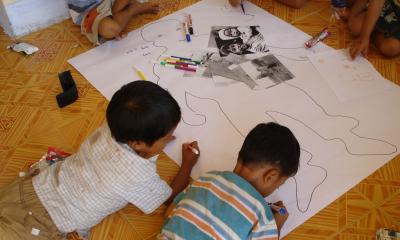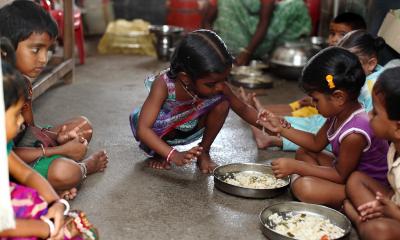
Health and wellbeing, alongside good nutrition, are fundamental to children and young people achieving their full potential in life, as set out in Sustainable Development Goals 2 & 3. Young Lives unique longitudinal data allows us to examine how exposure to poor health and nutrition in early childhood impacts long term life chances, and how widening inequalities increase the vulnerability of disadvantaged families to external shocks, including the COVID-19 pandemic, conflict and climate change.
- There have been significant improvements in the health and nutrition of Young Lives families over the last two decades. Children born today are less likely than their predecessors to be physically stunted, and more likely to have access to antenatal care, clean water and sanitation.
- Despite this progress, widening inequalities expose disadvantaged children to shockingly high rates of undernutrition.
- Malnutrition in early life can have severe long-term consequences, affecting physical growth, cognitive skills, and learning in school.
- Early growth stunting can be reversed over a much longer period than originally thought, well beyond the first 1,000 days and even up to the age of 15 years. Physical growth recovery is associated with better performance in cognitive tests and progression through school.
- The increasing prevalence of obesity, especially among urban households, is leading to the double burden of both under- and over-nutrition.
- The COVID-19 pandemic has led to rising levels of food insecurity, with an increasing proportion of vulnerable Young Lives households running out of food, potentially reversing past progress in improving nutrition and health.
- Increased childhood exposure to climate shocks such as droughts and floods is also having an unequal impact on children’s development, with children from the poorest households most affected.
- Rainfall shocks and malnutrition experienced by a mother while she is pregnant can affect the future development of her child’s vocabulary by age five. Longer term effects on basic maths and socio-emotional skills such as self-esteem, self-efficacy and agency, manifest even into adolescence.
- Rainfall shocks and malnutrition experienced by adolescent girls even before they became pregnant can have a negative impact on future children’s height, again from infancy through to adolescence.
- The pandemic is taking its toll on the mental health of young people, with a striking fall in subjective wellbeing and increased levels of anxiety and depression.
Health and wellbeing, alongside good nutrition, are fundamental to children and young people achieving their full potential in life, as set out in Sustainable Development Goals 2 & 3. Young Lives unique longitudinal data allows us to examine how exposure to poor health and nutrition in early childhood impacts long term life chances, and how widening inequalities increase the vulnerability of disadvantaged families to external shocks, including the COVID-19 pandemic, conflict and climate change.
- There have been significant improvements in the health and nutrition of Young Lives families over the last two decades. Children born today are less likely than their predecessors to be physically stunted, and more likely to have access to antenatal care, clean water and sanitation.
- Despite this progress, widening inequalities expose disadvantaged children to shockingly high rates of undernutrition.
- Malnutrition in early life can have severe long-term consequences, affecting physical growth, cognitive skills, and learning in school.
- Early growth stunting can be reversed over a much longer period than originally thought, well beyond the first 1,000 days and even up to the age of 15 years. Physical growth recovery is associated with better performance in cognitive tests and progression through school.
- The increasing prevalence of obesity, especially among urban households, is leading to the double burden of both under- and over-nutrition.
- The COVID-19 pandemic has led to rising levels of food insecurity, with an increasing proportion of vulnerable Young Lives households running out of food, potentially reversing past progress in improving nutrition and health.
- Increased childhood exposure to climate shocks such as droughts and floods is also having an unequal impact on children’s development, with children from the poorest households most affected.
- Rainfall shocks and malnutrition experienced by a mother while she is pregnant can affect the future development of her child’s vocabulary by age five. Longer term effects on basic maths and socio-emotional skills such as self-esteem, self-efficacy and agency, manifest even into adolescence.
- Rainfall shocks and malnutrition experienced by adolescent girls even before they became pregnant can have a negative impact on future children’s height, again from infancy through to adolescence.
- The pandemic is taking its toll on the mental health of young people, with a striking fall in subjective wellbeing and increased levels of anxiety and depression.




